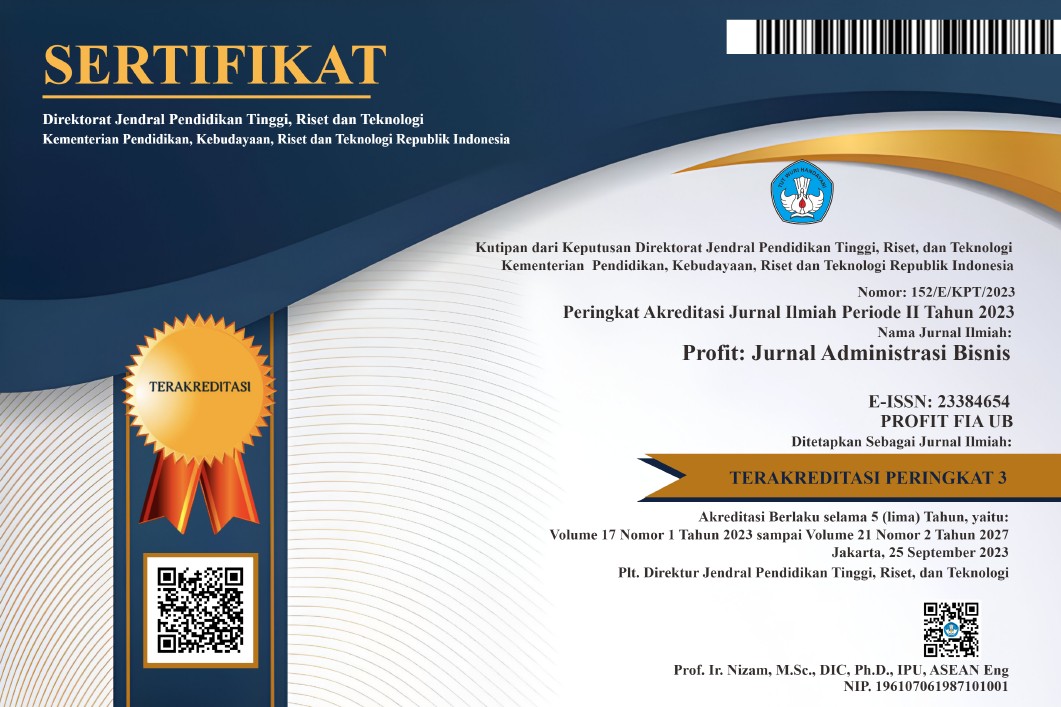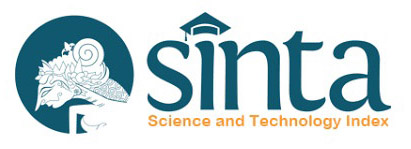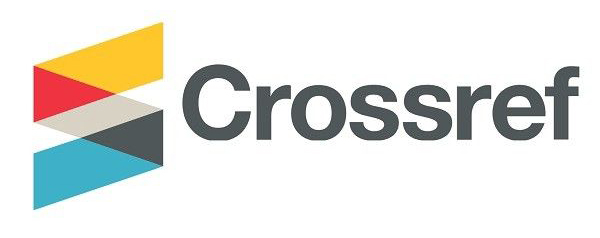ANALISIS PERILAKU PATUH PAJAK ORANG PRIBADI BERDASARKAN THEORY OF PLANNED BEHAVIOR DAN KEPERCAYAAN TERHADAP PEMERINTAH
DOI:
https://doi.org/10.21776/ub.profit.2019.013.01.4Keywords:
Tax compliance behavior, individual taxpayers, Theory of planned behaviorAbstract
Tax compliance behavior is a real action taken by taxpayers to calculate, deposit, and report taxes. The level of tax compliance in Indonesia is still low. This is evidenced by the data from the OECD and the directorate general of tax performance reports. Therefore, the purpose of this study is to analyze the factors that influence individual tax compliance behavior by using Theory of Planned Behavior and trust in the government. The variables used in this study are attitudes, subjective norms, control of perceived behavior, trust in the government, tax compliance intention, and tax compliance behavior. Data were collected through online survey methods. The population of this study is individual taxpayers on the Java island. The sampling method in this study is judgment sampling. This study used 120 respondents. The statistical method used in this research is Warp Partial Least Square (WarpPLS). The results of this study indicate that attitudes and subjective norms have a positive effect on the tax compliance intention and the tax compliance intention has a positive effect on tax compliance behavior. While perceived behavioral control does not have a positive effect on tax compliance intention, perceived behavioral control and trust in the government have no effect on tax compliance behavior.
Â
References
Ajzen, I. dan Fishbein, M. 1975. Belief, Attitude, Intention, and Behavior: An. Introduction to Theory and Research. MA: Addison-Wesley.
Ajzen, Icek, 1988. from intentions to actions: attitudes, personality, & behavior. Chicago: Dorsey Press
Birskyte, L. (2014). The impact of trust in government on tax paying behavior of nonfarm sole proprietors. Scientific Annals of the ‟Alexandru Ioan Cuzaâ€, University of IaÅŸi Economic Sciences, 61 (1), 1-15
Chucks, A. D., & Anthony, O. O. (2013). Tax Morale and Its Effect on Taxpayers’ Compliance to Tax Policies of the Nigerian Government. IOSR Journal of Business and Management (IOSR-JBM), 12(6), 35–55. Retrieved from http://www.iosrjournals.org/iosr-jbm/papers/Vol12-issue6/E01263555.pdf?id=6792.
Damayanti, T. W., dan Supomono. (2012). Apa Kata Mereka? Pengetahuan, Sikap, Niat Patuh Calon Pelaku Pajak. Akuntabilitas Jurnal Ilmiah Akuntansi, 12, 114-123.
Damayanti,Theresia woro; Sutrisno; Subekti, Imam; Baridwan, Zaki. 2015. Trust and Uncertainty Orientation: An Efforts to Create Tax Compliance in Social Psychology Framework. Social and Behavioral Sciences 211. 938 – 944
Devos, K. (2015). A Comparative Study of Compliant and Non- Compliant Individual Taxpayers in Australia. Journal of Business and Policy Research. 7(2), 180 – 196.
Gunadi. (2005). Fungsi Pemeriksaan Terhadap Peningkatan Kepatuhan Wajib Pajak (Tax Compliance). Jurnal Perpajakan Indonesia. Vol.4 no.5,p4-9.
Hartono, Jogiyanto (2007). Sistem Informasi Keperilakuan. Edisi Revisi. Yogyakarta: Andi Offset.
Jimenez, Peggy dan Iyer, Govin.S. 2016. Tax Compliance in Social Setting: The influence of social norms, Trust in Government, and perceived fairness on taxpayer compliance. Advances in accounting, incorporating Advances in International Accounting xxx.
Kusuma, H. (2018, Mei 3). Penerimaan Perpajakan 2017 Capai Rp/ 1339 Triliun dari Target. Detik.com. Diakses dari https://finance.detik.com/berita-ekonomi-bisnis/d-3795760/penerimaan-perpajakan-2017-capai-rp-1339-triliun-91-dari-target.
Levi, M., dan Stoker, L. (2000). Political Trust and Trustworthiness. Annual Review of Political Science, 3, 475-507.
Miller.A. 1974. Political issues and trust in government. The American Political Science Review,68(3), 951-972
Rahayu, Siti Kurnia. (2013). Perpajakan Indonesia. Yogyakarta: Graha Ilmu
Rosid, Aifin. (2017). The impact of perceptions of corruption upon intentional non compliance behavior of personal income taxpayers: anIndonesian Perspective. Disertation. School of taxation and business law UNSW business school.
Saad, Natrah. (2009). Fairness Perceptions and Compliance Behaviour: The Case of Salaried Taxpayers in Malaysia after Implementation of the SelfAssessment System. eJournal of Tax Research (2009) vol. 8, no. 1, pp. 32-63
Taylor, Shirley and Todd, Peter A (1995). Understanding Information Technology Usage: A Test of Competing Models. Information system research. Vol 6 No 2.pp 144-176
Torgler, B. (2002). Tax Morale and Institutions. CREMA Working Paper Series 2003 – 09, Center for Research in Economics, Management and the Arts (CREMA).
Purnamasari, Pratiwi, Sukirman. (2017). Pengaruh pemahaman, sanksi perpajakan, tingkat kepercayaan Pada pemerintah dan hukum, serta nasionalisme terhadap Kepatuhan wajib pajak dalam membayar PBB-P2 (Studi Pada Wajib Pajak PBB-P2 di Kota Banjar). Jurnal Akuntansi dan Auditing Volume 14/ No. 1 Tahun 2017: 22-39
Downloads
Published
Issue
Section
License
The copyright of the received article shall be assigned to the journal as the publisher of the journal. The intended copyright includes the right to publish the article in various forms (including reprints). The journal maintains the publishing rights to the published articles.

This work is licensed under a
Creative Commons Attribution-NonCommercial 4.0 International License

















